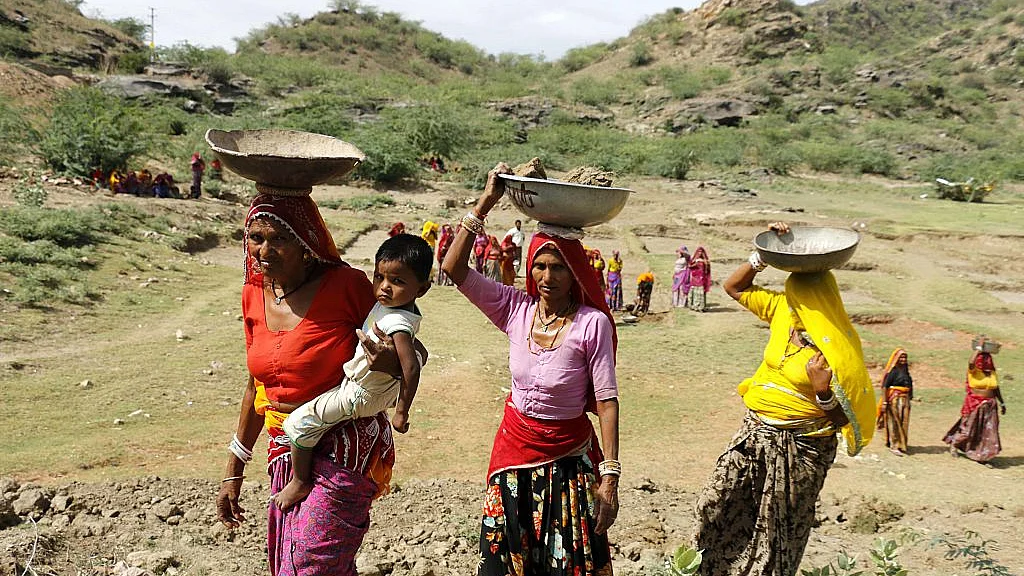NREGA workers demand increase in wages in line with the Minimum Wages Act
NREGA Sangharsh Morcha has written to the Prime Minister requesting that the wages of NREGA workers be increased to ₹600 from the average ₹179 in line with the Minimum Wages Act

About 5 crore families, dependent on the Mahatma Gandhi National Rural Employment Guarantee programme under the MNREG Act, are paid as little as Rs 179 as daily wages, which is one-fourth of the Rs 600 they are entitled to under the Minimum Wages Act.
While most households are able to get employment under the MNREGA, their wages have been abysmally low at an average of Rs 179 per day. In as many as 18 states, MNREGA wage rates are lower than the minimum wages fixed for them. This is blatant violation of the Minimum Wages Act (MWA) 1948.
The illegal delinking of NREGA wages from the MWA was reported by two committees—the Central Employment Guarantee Council (CEGC) in 2010 and the Mahendra Dev Committee (MDC) in 2013. Both these committees had representatives from the government, civil society groups and academics.
Moreover, as the MDC noted, NREGA wage rates, using the Consumer Price Index for Agricultural labourers (CPI-AL) fail to accurately represent the current consumption basket of rural households. The wages need to be indexed with the CPI of rural workers. The NREGA wages have remained stagnant over the years making it unfeasible for those living at subsistence level.
The recommendations from both these committees have been ignored. Instead, the Nagesh Singh Committee, set up by the Ministry of Rural Development which included only government representatives suggested delinking NREGA wages from the Minimum Wages Act and linking them with the Consumer Price Index for Rural Workers.
Former Additional Chief Secretary of Jharkhand, NN Sinha, a member of the Nagesh Singh Committee, wrote a dissenting note stating, “MNREGA work is the last recourse for the poor” and that lower payment would push the worker and his family into “sub-human existence”.
This dissenting note along with the recommendations of CEGC and the MDC reports are in line with the Supreme Court judgement in the Sanjit Roy Vs State of Rajasthan case (1983). The SC ruled that “if anything less than the minimum wage is paid to him, he can complain of violation of his fundamental right under Article 23 [Right against Exploitation] and ask the Court to direct payment of the minimum wage to him”. Thus, the low NREGA wages and the Nagesh Singh Committee report are not just in contravention of the MWA but are also unconstitutional as per the SC judgement.
The Ministry of Labour and Employment set up an expert committee on determining the methodology for fixing the national minimum wage under the chairmanship of Anoop Satpathy has recommended a national floor minimum wage of ₹375 per day keeping in mind the daily requirement of 2400 calories, 50 grams of protein and 30 grams of fats for a person.
According to eminent nutritionist Dr Wallace Aykroyd an average Indian adult engaged in moderate activity should consume 2700 calories comprising 65 grams of protein and around 45-60 grams of fat”.
Using this approach, the daily minimum wages for an NREGA worker comes to ₹600 per day. It must be kept in mind that NREGA work peaks in the pre-monsoon season when the work conditions are the most taxing. Thus, nutrition intake must be commensurate to produce a more dignified and healthier work force. As a positive spillover effect, this will also lead to a more productive labour force.
According to the NREGA Sangharsh Morcha, even a rapid survey would show that the NREGA wages are not commensurate with the quantity of work done thereby causing a blow to the asset building goals too. Furthermore, the strategy to link NREGA to other asset creation programmes have further reduced the scope of additional availability of work in villages.
On March 1, 2019, several hundreds of workers across 50 districts in nine states had filed FIRs against Prime Minister Narendra Modi due to non-payment of promised wages under the rural employment scheme. FIRs have been filed in 150 police stations under Sections 116 and 420 of the Indian Penal Code (IPC).
The workers said between October 2018 and February 1, 2019, Fund Transfer Orders (FTOs) were not processed in many states due to lack of available funds for the scheme. According to the NREGA portal, payments worth Rs 9,573 crore are due for material and employed labour as of February 2018.
Follow us on: Facebook, Twitter, Google News, Instagram
Join our official telegram channel (@nationalherald) and stay updated with the latest headlines
